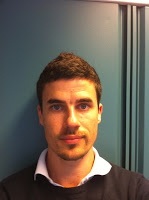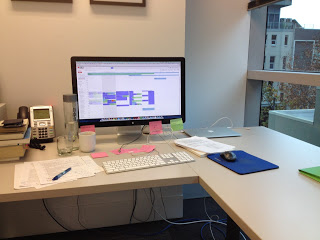I am Jonathan Laskovsky and This is How I Work
 Today, I am interviewing Jonathan Laskovsky for the “How I Work” series. Jonathan is the Senior Coordinator, Research Partnerships in the College of Design and Social Context at RMIT University. Alongside this role, Jonathan has research interests in modern and postmodern literature with a particular focus on fictional space and critical theory. He has a BA(Hons) in Philosophy from La Trobe University (Aus), and an MA in Critical Methodology from King’s College London (UK). Jonathan is in his first year of a part-time PhD at Monash University.
Today, I am interviewing Jonathan Laskovsky for the “How I Work” series. Jonathan is the Senior Coordinator, Research Partnerships in the College of Design and Social Context at RMIT University. Alongside this role, Jonathan has research interests in modern and postmodern literature with a particular focus on fictional space and critical theory. He has a BA(Hons) in Philosophy from La Trobe University (Aus), and an MA in Critical Methodology from King’s College London (UK). Jonathan is in his first year of a part-time PhD at Monash University.
Current Job: Senior Coordinator, Research Partnerships and PhD student (3 weeks in)
Current Location: Melbourne, Australia
Current mobile device: iPhone 4s 64Gb
Current computer: Work: Macbook air 13″ with 20″ Thunderbolt display. Home: 21.5″ iMac
Can you briefly explain your current situation and research to us?
I work in the College of Design and Social Context providing support to Research staff across 7 Schools. My research is focussed on spaces in fiction – primarily postmodern fiction – as affective or disruptive on the realms of fiction, theory and the real world.
What tools, apps and software are essential to your workflow?
I use Google Mail for personal and work purposes. I also work with Google Docs and Drive quite a bit. Evernote I use a lot both on desktop and mobile versions for writing and notes etc. I use Excel a lot for work and Word for developing articles etc but I’m slowly moving more to Google docs for this. I use TypeForm for survey work and have just bought my first Google Book.
What does your workspace setup look like?
My workplace is a desk in a shared (2-person) office though I often have meetings elsewhere on campus. I use the local cafe a lot for meetings as it’s central and has wifi etc.
What is your best advice for productive academic work?
Two points: Use your calendar as a hard landscape, and go to Shut Up and Write sessions.
How do you keep an overview of projects and tasks?
I keep a running project list in Evernote. I also use a GTD approach to email which helps a lot. This was introduced to me in the UK by a consultant Steve Stark who runs this website – I’m a complete convert and zealot with this system as it has redefined the way I work with email.
Besides phone and computer, do you use other technological tools in work and daily life?
I have an iPad that I use at home for couch surfing and a PS3 for gaming but my laptop and iPhone get the most use.
Which skill makes you stand out as an academic?
As a very new PhD student, I’m hesitant to say this makes me stand out but I organise my work well and am productive in my work life. This will help me as a part-time PhD student. Also, whilst not technically a skill, as part of my day job I’ve had to review 100s of postdoc applications so I know what my CV needs to look like at the end of my PhD in order to be competitive in the job market.
What do you listen to when you work?
Primarily music with no lyrics. Three stalwarts are: “Global Underground 13 (disc 1)” by Sasha, “Money Jungle” by Mingus/Ellington/Roach, “DE9: Transitions” by Richie Hawtin. I also like the Dark Knight soundtrack.
What are you currently reading? How do you find time for reading?
Currently reading Life: A Users Manual by George Perec and re-reading Of Course You End Up Becoming Yourself the David Foster Wallace interview by David Lipsky. I generally read on the train and in the evening before bed.
Are you more of an introvert or extrovert?
Somewhat extroverted. My writing is fairly solo work so I like Shut Up and Write sessions as they are productive and socialise the often solitary writing process.
What’s your sleep routine like?
Pretty consistent. Usually in bed by 10:30-11:00pm, up at 7am for work or 8am on the weekends.
What’s your work routine like?
I get in to work at 8am and work on my phd for an hour each day (after reading on the train) then switch over to my day job work. I find it hard to write in the evenings so mainly read then. Every Friday I do a Shut Up and Write session. Writing on the weekends hasn’t quite worked yet but I’m tweaking the routine.
What’s the best advice you ever received?
Remember to keep the main thing the main thing. In other words, keep your goal in sight at all times.

